
Miles to go before the Moonby Dwayne A. Day
|
 Moonlight Mile’s protagonist, Gorou Saruwatari. |
Moonlight Mile is set in the 2020s as humanity is preparing to build a base on the Moon. The Nexus Project is a plan to mine helium-3 to fuel power stations that will beam energy back to Earth. The story centers around two main characters, Gorou Saruwatari and Jack F. “Lostman” Woodbridge, with most of the focus on Gorou (pronounced “Goro”). Gorou is a Japanese construction worker and Woodbridge an American fighter pilot who are friends by virtue of their shared hobby of mountain climbing. They are adventurous risk-takers at heart, perfectly suited for space exploration. In the pilot episode, after scaling Mount Everest, they mutually decide that the last mountain to scale is space, and both set out to become astronauts.
Over the course of eight episodes on the US DVD release, both men struggle to achieve their goal, and experience various setbacks. Woodbridge is shot down during a conflict in the Middle East and becomes a prisoner of war. Gorou is selected for the astronaut corps of the newly-formed International Space Agency (ISA), but numerous bureaucratic and technological setbacks condemn him to being perpetually in training and never selected to actually fly into space‒until he eventually gets chosen to launch aboard a Russian spaceplane with a dangerous reputation. After many years, Gorou and Woodbridge eventually meet up aboard the International Space Station, a much upgraded and bigger version of the ISS of today.
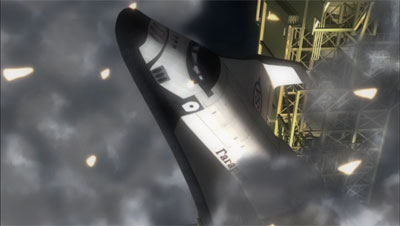 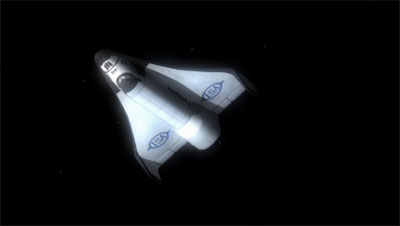 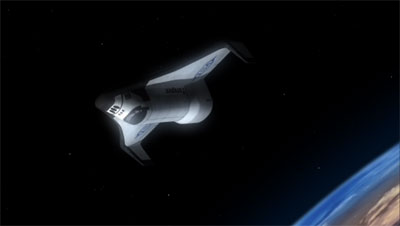 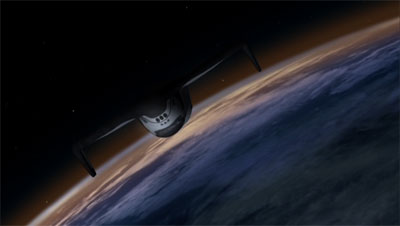 The trouble-plagued Russian space shuttle Gagarin. |
The series first began airing in Japan in spring 2007. To date, two DVDs have been released in the United States, featuring a total of eight 22-minute episodes. There are no extras. The third DVD is due for release in May. Based upon the images in the opening credits, there is a lot of action left to come, which is good, because it was lacking in the first episodes.
The series is visually interesting, demonstrating production values nearly equal to the anime series Freedom (although Freedom was produced in HD-DVD format). The animation is quite good for a non-feature film. The animators have chosen the now-common approach of using 2-D drawn characters and 3-D computer generated spacecraft, but they are so good at blending the two that they have avoided the jarring transitions that occur with many programs that have attempted this look. The show features some stunning landscapes and beautifully colored scenes, not to mention technically accurate and exciting depictions of spacecraft. However, the animators do a much poorer job of depicting people. Although they have avoided many of the typical anime clichés of big-eyed, short-skirted gun-toting teeny-boppers, very few of the people in the series look like they could really exist. Virtually all of the men appear to be hulking bodybuilders, practically gorillas. The women have all had, well, gravity-defying enhancements. They might as well all be androids.
 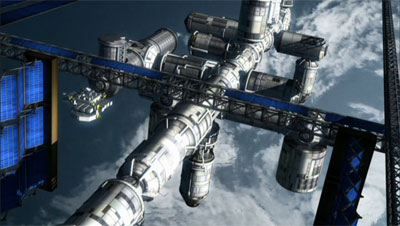 Some examples of Moonlight Mile’s sometimes stunning animation, which skillfully mixes 3-D computer generated imagery with more traditional animation techniques. |
Unfortunately, the writing also leaves much to be desired and neither the stories nor the characters live up to the promise of the opening credits or the animation. The very first episode starts with a teaser about a murder covering up military action on the surface of the Moon, and the opening credits feature numerous action sequences promising a fast-paced intrigue-filled plot that fails to materialize during the first eight episodes. Because the remaining episodes have not yet been released in the United States, my suspicions cannot be considered spoilers, but the show hints that the Moonbase is established and a shadowy military group‒either American or international‒has other plans for it. Space war ensues. But after three hours of episodes, none of that has yet occurred, and by the end of episode eight humans have not even returned to the Moon. Instead, the audience is treated to what could best be considered character exposition interspersed with spurious space accidents, as we are shown Gorou’s activities and minor adventures trying to get into space. It’s a long way to go to get to the Moon, or the action.
The individual episodes often border on being both irrelevant and boring, and the storytelling is occasionally clunky. For example, in one episode Woodbridge is shot down over the Middle East, captured, and escapes, all in about fifteen minutes. But how long this entire period lasts for Woodbridge is never clear, although later there are hints that it must have been at least a year. In the seventh episode we learn that seven years have passed for the two men, something that is not obvious from the individual episodes themselves. In addition, some characters are introduced only to disappear at the end of an episode never to be seen again. Others, like the mysterious female ISA executive Riyoko Ikeuchi, are somehow manipulating events for reasons that are never explained. Maybe the explanation is still to come in a much later episode, but after many episodes of this it simply feels less like mystery and more like poor writing. In fact, if somebody edited the first eight episodes and cut out about a third of the scenes, the entire story arc would make more sense and flow much better.
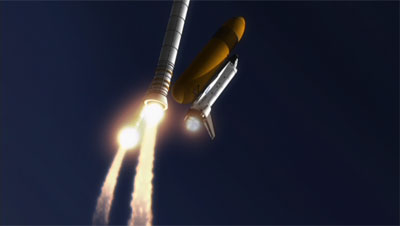 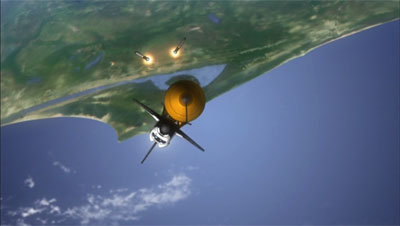 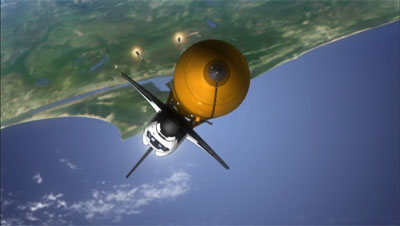 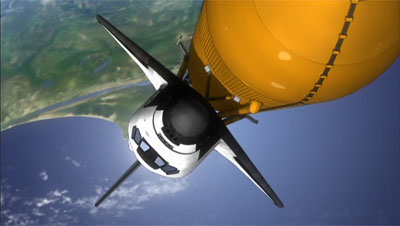 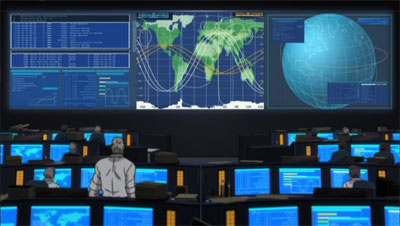 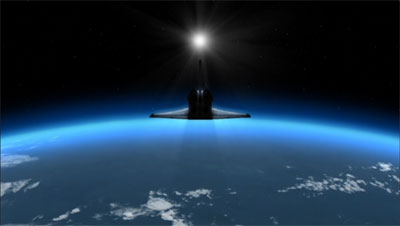 Moonlight Mile strives for a high degree of technical accuracy in its depiction of spaceflight. |
The big problem is the characters. The show suffers from what could be called Everyman Syndrome. The standard cliché of astronauts in movies is that they are nerd-jocks often played for comical effect. So it is common for science fiction films to try and humanize their protagonists by forgoing the superhuman astronaut route and instead give them working class hero traits like physical labor jobs and bad social skills. This is an attempt to broaden their appeal to an audience that is obviously not filled with test pilots, doctors, and Ph.D. astrophysicists. So we get characters like Val Kilmer’s mechanic in the 2000 film Red Planet, or the comical oil drillers of the 1998 movie Armageddon, or the old guys of Space Cowboys.
Moonlight Mile really overdoes this working class joe approach. Gorou manages to be simultaneously original and a clichˇ. He is initially portrayed as the ultimate working-class slob: a hard-drinking, hard-swearing, whoring clown who is proficient at operating sophisticated construction machinery, and has resisted being promoted to a desk job at his company. He works hard and then hits the bar, where he usually ends up naked, performing his signature dance too obscene to be described here.
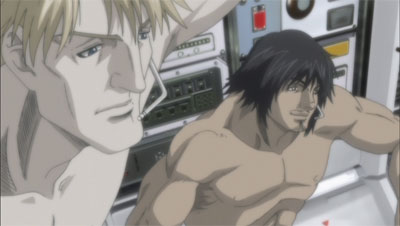 Lostman and Gorou. |
Gorou gets selected for the astronaut corps both because of his demonstrated skill with heavy machinery and his hard work, and also because of what his superiors sense is a hidden dedication to spaceflight‒simply put, they suspect that he is exactly the kind of intelligent hardhat that will be required in the near future to build the Moonbase. Once he becomes part of the astronaut corps, as a “builder,” Gorou proves to be incredibly hard-working, intelligent, and risk-taking. And that’s when he appears to be exactly where he is supposed to be. But the writers take this too far and Gorou is often too perfect, always coming up with a solution when the more experienced astronauts around him fail. The writers’ efforts to soften the character, to show that he has fears and self-doubt, are clunky and unconvincing. Indeed, it feels like they are constantly overcorrecting for his character traits, making him clever and dedicated one minute and offensive the next. To their credit, though, they never portray Gorou as a jerk towards others.
There are really two problems with the character, essentially two sides of the same coin. The first is that it becomes virtually impossible to believe that a person so incredibly crude, whose drinking borders on alcoholism and whose attitude towards women borders on Neanderthal, would either want to or even be considered to be an astronaut‒let alone get selected. The Gorou portrayed in the first few episodes is barely socially functional, and not really a team player. There is no reason to believe that he would abandon his booze or his latest female conquest in order to do the job.
The other problem is that Gorou is simply offensive, so much so that what initially seems like comedy quickly becomes bizarre, and not really believable. In fact, it often seems like the writers are trying way too hard to make the show edgy by having Gorou engage in random profanity and fornication that have little connection to the actual plot. The writers wanted the audience to like this godlike Everyman character, but they so botched the narrative that it’s hard to believe that anybody could have Gorou’s personality traits and not end up in jail, a mental institution, or dead, let alone hold a job. It’s impossible to believe that he could ever become an astronaut. This is an adult cartoon, with swearing, nudity, and adult situations. But the writers have gone overboard. There’s too much of all of these things, to the point where it seems like parody, with the characters swearing their heads off for no apparent reason or bedding a buxom woman simply to satisfy the male audience (so-called “fanservice”). Some of this can be chalked up to bad translation from the original Japanese. But it is clear that in their zeal to make their protagonists seem like ordinary guys, they messed up badly; ordinary guys like this would be declared a menace to society, not made astronauts.
Woodbridge is not so broadly or clearly written. It’s never clear what really motivates him beyond getting into space. Unlike Gorou, he appears to have few vices, but also a virtually nonexistent personality. The stories become much more dull and uninteresting whenever they focus on him.
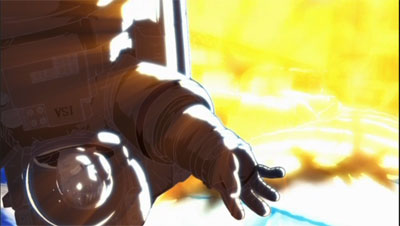 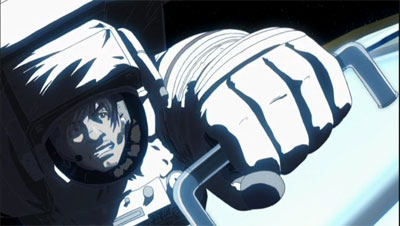 Despite the promise of its opening credits, the first eight episodes deliver relatively little action. |
At times Moonlight Mile can be beautiful to watch, and even prurient from a space enthusiast’s perspective‒the ISA is clearly not starved for funds in its near future, and can afford all kinds of neat toys. The technology is portrayed in a realistic way, although sometimes rather oddly. For instance, at one point during a space shuttle launch the characters get into a discussion of what flawed technology the shuttle represents, although this is a future when NASA apparently has lots of shuttles and plenty of money.
The show also does have some subtle humor as well. For instance, at one point Gorou comments about a two-legged moonbuggy under construction, saying that only Japan would come up with such an absurd device. When he asks how such a ridiculous vehicle ever got funded, the bureaucrat showing it to him deadpans “Mind your own business.” (Well, it was funnier on screen.)
But the individual stories frequently telegraph their outcome. If a new character is introduced at the beginning of an episode, they are often portrayed without much subtlety, so that you know where the story is headed within a few minutes. For instance, the good family man is of course going to be placed in peril, only to be rescued through Gorou’s hard work. And scenes of training challenges or hardware glitches clearly indicate some dangerous situation that will face the heroes later on. It becomes so obvious that you almost want to freeze the episode, jot the rest of the plot on the back of an envelope, and then see how well you’ve done, playing a game of foreshadowing bingo.
Eight episodes of neato spaceships in a future that will never exist may be bad for the soul, but Moonlight Mile’s primary offense is that it’s dull. The only reason to continue is because of the promise in the opening credits of dramatic action‒well, a war, anyway‒on the surface of the Moon.
For fans of escapist, near-future science fiction‒and I’ll admit that it’s one of my entertainment vices‒Moonlight Mile is tolerable, if not very engaging. We can hope for this kind of future, although we certainly want it to be populated by a better class of heroes than Gorou.
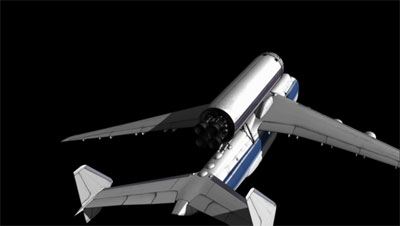 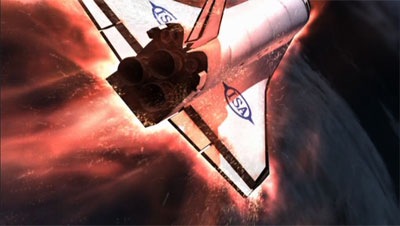 |